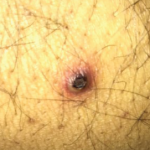NEW YORK (Reuters Health)—The human IgG1 anti-TNF antibody adalimumab is safe and effective for short- and long-term treatment, and the calcineurin inhibitor tacrolimus given short-term brings remission, in patients with refractory ulcerative colitis, according to two new studies in the Journal of Crohn’s and Colitis.
In the first study, online Sept. 21, Dr. Tamas Molnar from University of Szeged in Hungary examined the short- and long-term efficacy and safety of adalimumab in every adalimumab-treated ulcerative colitis patient from each center in Hungary that uses the drug.
Of the 73 patients included in the report, 49 had been treated previously with infliximab. A third of the patients were on steroids and just over half (52%) were on immunosuppressants at baseline.
By week 12, 49.3% of patients experienced a clinical response, 26% achieved remission, and 24.7% remained unresponsive to induction treatment.
By week 52, 45.2% of patients showed a continuous clinical response with adalimumab. Results did not differ according to prior treatment (or not) with infliximab.
“In the real-life setting, adalimumab is more efficacious than in the studies,” Dr. Molnar told Reuters Health by email. “Adalimumab can be optimal for chronic refractory, steroid-dependent ulcerative colitis. We have no data about the role of adalimumab in acute, steroid-refractory colitis.”
In a second study, online Sept. 29, Dr. Jurgen Buning from University Hospital of Schleswig-Holstein in Lubeck, Germany, and colleagues examined the long-term outcome of tacrolimus-treated steroid-refractory ulcerative colitis.
The 156 patients included in their study received tacrolimus orally or intravenously daily for a median 5.3 months (range, 0.1–47.2 months). About half the patients (n=89) also received a purine analogue in the early course of tacrolimus, and 79 of 137 patients without colectomy or relapse by week 12 received purine analogue therapy thereafter.
Overall, colectomy was performed in 45 patients, including 18 within the first three months while receiving tacrolimus, five more by six months, five more before 12 months, seven more by 24 months, and 10 beyond 24 months.
Two-thirds of the patients achieved clinical remission which they maintained a median 0.9 years. Remission rates fell to 53.8% at 12 months and 39.7% at 24 months.
Colectomy rates did not differ significantly between patients treated with purine analogues and without purine analogues (18% vs. 22%; p=0.49).
Median times to colectomy, however, were significantly longer in patients who also received purine analogues (two years) than in those who did not receive purine analogues (0.8 year). Remission rates were also higher in patients treated with purine analogues (82% vs. 51% without purine analogues).


